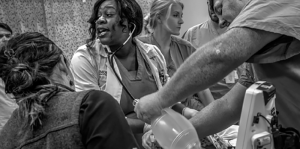Presented By: Science, Technology and Society
STS Speaker Series. In the Flow: Affect and Protocol in US Medical Practice
Scott Stonington, U-M Anthropology / Medical School

Why do biomedical clinicians sometimes practice contrary to their own expertise? Medicine is often described as a modernist project in search of a universal “view from nowhere.” In this talk, I show how this view systematically breaks down due to the impingement of sensation, emotion, affect and social forces into the embodied “flow” of moving in and against time in clinical practice. Using ethnographic and autoethnographic data, I present paradoxes of counter-protocol medical decisions from a variety of contexts in the U.S. that cease to be paradoxical if we step into clinicians’ embodied worlds.
Scott Stonington, MD/PhD is Associate Professor of Anthropology and Internal Medicine at the University of Michigan. In addition to teaching and scholarship, he also practices primary care and hospitalist medicine. His first book, The Spirit Ambulance: Choreographing the End of Life in Thailand, won prizes from the American Ethnological Society, Society for Humanistic Anthropology, and the Society for Medical Anthropology. He also edits the first two series in major medical journals dedicated to social theory: the New England Journal of Medicine’s “Case Studies in Social Medicine,” and the Lancet’s “Global Social Medicine Case Series.”
Scott Stonington, MD/PhD is Associate Professor of Anthropology and Internal Medicine at the University of Michigan. In addition to teaching and scholarship, he also practices primary care and hospitalist medicine. His first book, The Spirit Ambulance: Choreographing the End of Life in Thailand, won prizes from the American Ethnological Society, Society for Humanistic Anthropology, and the Society for Medical Anthropology. He also edits the first two series in major medical journals dedicated to social theory: the New England Journal of Medicine’s “Case Studies in Social Medicine,” and the Lancet’s “Global Social Medicine Case Series.”